Related Research Articles

Jean-Philippe Léo Smet, better known by his stage name Johnny Hallyday, was a French rock and roll and pop singer and actor, credited with having brought rock and roll to France.

Sylvie Vartan is a Bulgarian-French singer and actress. She is known as one of the most productive and tough-sounding yé-yé artists. Her performances often featured elaborate show-dance choreography, and she made many appearances on French and Italian TV.

"Promised Land" is a song lyric written by Chuck Berry to the melody of "Wabash Cannonball", an American folk song. The song was first recorded in this version by Berry in 1964 for his album St. Louis to Liverpool. Released in December 1964, it was Berry's fourth single issued following his prison term for a Mann Act conviction. The record peaked at #41 in the Billboard charts on January 16, 1965.
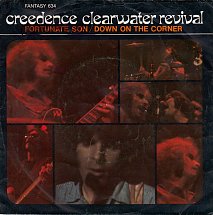
"Fortunate Son" is a song by the American rock band Creedence Clearwater Revival, released on the band's fourth studio album, Willy and the Poor Boys in October 1969. It was previously released as a single, together with "Down on the Corner", in September 1969. It soon became a Vietnam anti-war movement anthem and an expressive symbol of the counterculture's opposition to U.S. military involvement in the Vietnam War and solidarity with the soldiers fighting it. The song has been featured extensively in pop culture depictions of the Vietnam War and the anti-war movement.
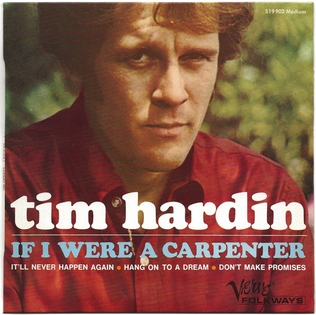
"If I Were a Carpenter" is a folk song written by Tim Hardin in the 1960s, and re-recorded with commercial success by various artists including Bobby Darin, The Four Tops and Johnny Cash. Hardin's own recording of the piece appeared on his 1967 album Tim Hardin 2. It was one of two songs from that release performed by Hardin at Woodstock in 1969. The song, believed by some to be about male romantic insecurity, is rumored to have been inspired by his love for actress Susan Morss, as well as the construction of Hardin's recording studio.

David Hallyday is a French singer, songwriter, actor and amateur sports car racer.

"Da Doo Ron Ron (When He Walked Me Home)" is a song written by Jeff Barry, Ellie Greenwich and Phil Spector. It first became a popular top five hit single for the American girl group the Crystals in 1963. American teen idol Shaun Cassidy recorded the song in 1977 and his version hit number one on the Billboard Hot 100 chart. There have also been many other cover versions of this song, including one by the songwriters Jeff Barry and Ellie Greenwich themselves, performing as the Raindrops.

Solitude à deux is an album by the French singer Johnny Hallyday.
Salut les copains is a series of albums released through Universal Music France to commemorate the best of music featured in French scene as sponsored by the "Salut les copains" radio program in France and the French Salut les copains magazine. The tracks include French original singles, French-language covers of known hits as well as European and American hits popular in France. The track list is a representative wide selection of the "Yé-yé" generation of French music.

Pierre Antoine Muraccioli, known professionally as Antoine, is a French pop singer, and also a sailor, adventurer, writer, photographer, and filmmaker.

D'où viens-tu Johnny ? is a 1963 French film directed by Noël Howard, starring French rock and pop idols Johnny Hallyday and Sylvie Vartan, both of whom would later marry two years later.
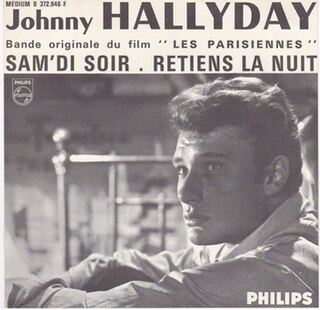
"Retiens la nuit" is a song by French singer Johnny Hallyday from his 1961 studio album Salut les copains. It was also released as an EP in February 1962 and as a single two months prior. The song was also featured in the 1962 French comedy-drama anthology film "Les parisiennes", which starred Hallyday.
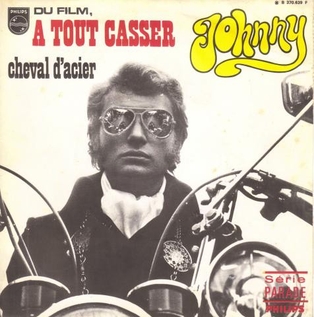
"À tout casser" is a song by French singer and actor Johnny Hallyday. It was used in the opening title sequence of the 1968 film of the same name. Hallyday also released it as a single and on his 1968 studio album Jeune homme The B-side "Cheval d'acier" also appears in the film, where Hallyday performs it on stage.

"Ma guitare" is a song by French singer Johnny Hallyday from the 1963 film D'où viens-tu Johnny? It was also released on a double A-side single.

"Prends ma vie" is a song by French singer Johnny Hallyday. In 1974 it was released as the lead single off of Hallyday's 1974 studio album Je t'aime, je t'aime, je t'aime.
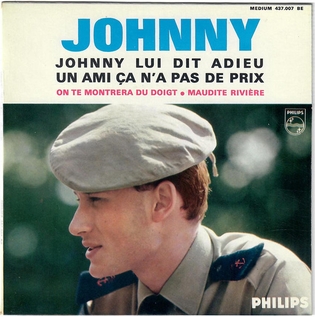
"Un ami ça n'a pas de prix" is a song by French singer Johnny Hallyday. It was released on an EP titled "Johnny lui dit adieu / Un ami ça n'a pas de prix" in January 1965.

"Makin' Love" is a song written and originally released by American country singer Floyd Robinson. He released it as a single in 1959 and was featured on his self-titled debut album the following year.
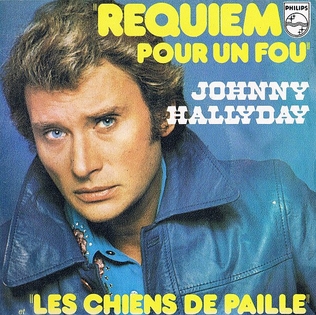
"Requiem pour un fou" is a song by French singer Johnny Hallyday. It was released in February 1976 as the lead single off of his twenty-first studio album, "Derrière l'amour", released later that year in June. Hallyday has also re-recorded the song in Italian, Spanish, and English and has also released duet versions with Bolton and Belgian-Italian singer Lara Fabian in 1996 and 1999 respectively, the ladder duet being a live performance at the Stade de France in Septmber 1998.

"Mirador" is a 1989 ballad recorded by French singer Johnny Hallyday. Written by Étienne Roda-Gil with a music composed by Hallyday's son David Hallyday, it was the first single from his 36th studio album Cadillac, on which it appears as the second track, and was released in June 1989. It achieved success in France where it was a top three hit.

"Diego libre dans sa tête" is a 1981 song written by Michel Berger for his wife France Gall for her studio album Tout pour la musique, on which it is the eighth track. Two years later, Berger himself recorded his own version of the song. In 1991, it gained popularity when Johnny Hallyday released a live cover which became a top ten hit in France.
References
- ↑ https://hallyday.com/Son/Sessions/ses71.html
- 1 2 "Oh, ma jolie Sarah - Johnny Hallyday - Hit-Parade.net" . Retrieved 2017-11-16.
- ↑ "Johnny Hallyday – Oh! Ma jolie Sarah" (in French). Ultratop 50. Retrieved 2024-02-08.